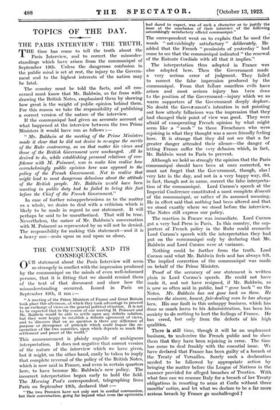THE COMMUNIQUE AND ITS CONSEQUENCES.
OUR statement about the Paris Interview will seem so strangely in conflict with the impression produced by the communique on the minds of even well-informed persons, that it is fitting that we should remind them of the text of that document and show how the misunderstanding occurred. Issued in Paris on September 19th, it ran :— " A meeting of the Prime Ministers of France and Great Britain took place this afternoon, of which they took advantage to proceed to an exchange of views on the general political situation. It is not to be expected that in the course of one meeting M. Poincarti and Mr. Baldwin would be able to settle upon any definite solution, but they were happy to establish a definite agreement of views, and to discover that on no question is there any difference of purpose or divergence of principle which could impair the co- operation of the two countries, upon which depends so much the settlement and peace of the world."
This announcement is plainly capable of ambiguous interpretation. It does not negative that correct version of the nature of the interview which we have given, but it might, on the other hand, easily be taken to imply that complete reversal of the policy of the British Notes, which is now said in France, and even in certain quarters here, to have become Mr. Baldwin's new policy. The incorrect interpretation began early to hold the field. The Morning Post's correspondent, telegraphing from Paris on September 19th, declared that :— " The two Premiers have not only met in cordial communion, but their conversation, going far beyond what even the optimistic
had dared to expect, was of such a character as to justify the issue at the conclusion of their interview of the following astonishingly satisfactory official communiqué."
The correspondent went on to explain that he used the words "astonishingly satisfactory" deliberately. He added that the French "pessimists of yesterday" had come to see that the communique indicated "the renewal of the Entente Cordiale with all that it implies.".
The interpretation thus adopted in France was also adopted here. Then the Government made a very serious error of judgment. They failed to correct the false impression produced by the communiqué. From that failure countless evils have arisen and most serious injury has been done to the position of the Government—injury which we as warm supporters of the Government deeply deplore. No doubt the Gov( rament's intention in not pointing out how utterly fallacious was the impression that they had changed their point of view was good. They were afraid of exasperating French opinion by what might seem like a " snub " to those Frenchmen who were rejoicing in what they thought was a more friendly feeling here. It is strange that they did not see that a far greater danger attended their silence—the danger of letting France suffer the very delusion which, in fact,. Mr. Baldwin went to Paris to prevent.
Although we hold so strongly the opinion that the Paris communique should have been at once corrected, we must not forget that the Government, though, alas ! very late in the day, and not in a very happy way, did, in fact, though not in name, correct the false interpreta- tion of the communique. Lord Curzon's speech at the Imperial Conference constituted a most complete dementi of the communiqué, or rather of its assumed meaning. He in effect said that nothing had been altered and that we stood exactly where we stood before the interview. The Notes still express our policy.
The reaction in France was immediate. Lord Curzon got a very bad Press in Paris. In this country, the sup- porters of French policy in the Ruhr could reconcile Lord Curzon's speech with the interpretation they had put on the communique only by declaring that Mr. Baldwin and Lord Curzon were at variance.
Nothing could be further from the truth: Lord Curzon said what Mr. Baldwin feels and has always felt. The implied correction of the communique was made on behalf of the Prime Minister, Proof of the accuracy of our statement is written plain in Lord Curzon's speech. He could not have made it, and not have resigned, if Mr. Baldwin, as is now so often said in public, had "gone back" on the Notes. Mr. Baldwin has not gone back on them. He remains the sincere, honest, fair-dealing man he has always been. His one fault in this unhappy business, which has done so much harm to his Administration, has been his anxiety to do nothing to hurt the feelings of France. He has erred, but only from the defects of his high qualities.
There is still time, though it will be an unpleasant business, to undeceive the French public and to show them that they have been rejoicing in error. The time has come to deal frankly with the essential issue. We have declared that France has been guilty of a breach of the Treaty of Versailles. Surely such a declaration needed to be followed by appropriate action by bringing the matter before the League of Nations in the manner provided for alleged breaches of Treaties. With what face can we censure Italy for a.breach of her Treaty obligations in resorting to arms at Corfu .without three months' notice, and let what we declare to be a far more serious breach by France go unchallenged?


























































 Previous page
Previous page